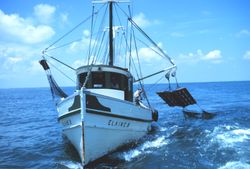 Fifty countries concerned about the depletion of fish stocks in the Mediterranean Sea have committed to a set of measures that includes better netting to allow for the escape of juveniles and an annual six-month hiatus for many fleets. The measures were adopted earlier this month in Rome during the annual UN meeting of a Mediterranean fisheries commission and launched new ways to manage unreported and unregulated fishing…
Fifty countries concerned about the depletion of fish stocks in the Mediterranean Sea have committed to a set of measures that includes better netting to allow for the escape of juveniles and an annual six-month hiatus for many fleets. The measures were adopted earlier this month in Rome during the annual UN meeting of a Mediterranean fisheries commission and launched new ways to manage unreported and unregulated fishing…
“This is a milestone — we will now have a tool for getting a complete picture of what kind of fishing is going on in the entire area, and to finally be able to address the management of multispecies fisheries,” said the group’s Secretary Alain Bonzon.
One of the meeting’s main outcomes was an agreement on the use of new, more selective types of netting in bottom trawls. Changes to the shape of the mesh holes in the “cod end” section of the trawls will permit small juvenile fish that have not yet reproduced to escape capture and return to the wild to breed.
The commission also agreed to adopt the new rules for tuna fishing enacted last year by the International Commission for the Conservation of Atlantic Tuna. Catches of blue-fin tuna plunged by almost half from 1994 to 2002 and the measures include a 15-year recovery plan for the tuna starting in 2007 and running through 2022.
The plan also calls for six-month off seasons for specific types of boats, banning the use of aircraft in spotting tuna, forbidding the capture of tuna under 30 kilograms except in certain specific circumstances, and requires better reporting of tuna catches. It also allows tuna to only be offloaded at designated ports and obliges countries to place observers on boats to monitor their adherence to regulations.
Pledging support to the protection measures are Albania, Algeria, Bulgaria, Croatia, Cyprus, Egypt, Greece, Israel, Italy, Japan, Lebanon, Libya, Malta, Monaco, Morocco, Romania, Slovenia, Serbia, Spain, Syria, Tunisia and Turkey, and the European Community.



















